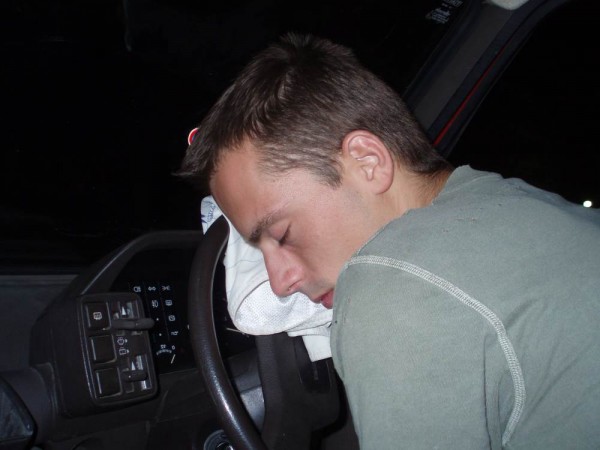Driving while tired can affect your concentration and reactions enough to make it as bad as driving drunk. If you leave it too long you will eventually fall asleep and have an accident that’s usually worse than if you had been awake because you won’t be able to react.
How to know if you are driving while too tired
- You start to yawn frequently
- Your blinking increases and you rub your eyes more
- You can’t remember the last few miles you drove
- You find it difficult to stay in your lane, perhaps drifting onto the other side of the road, or over the left edge line
- You have to make an effort to maintain a consistent speed and not either tailgate the vehicle in front, or fall much further back
- Your head begins to nod
- You notice that the road noise drops out (a sign you are actually having a microsleep)
- You miss road signs
- You can’t remember the last sign you passed
- You are driving during your body’s natural sleep cycles (the circadian rhythm, between 2-4pm and 1-6am).
As mentioned above, drowsiness gives way to microsleeps which are instances of sleep from a fraction of a second up to several minutes. The longer these microsleeps the more likely you are to run off the road, and in tiredness-related accidents 99% of them involve either running off the road or having a head-on collision. Then you might never wake up.
Research has shown that around 20% of crashes are as a result of fatigue or tiredness, and drivers may be prosecuted for negligent or careless driving if they cause an accident through falling asleep.
What causes drowsiness?
There are a large number of causes and some of them depend on your specific situation
- Some over-the-counter medications and quite a few prescription medications – this article gives you more information about driving after taking medicine.
- Alcohol and some illegal drugs
- A large meal (particularly if it’s lunch as it comes before your natural sleep window starting at 3pm). Heavy lunches with fat and protein cause more problems
- Dehydration (which can be exacerbated by eating a lot of protein seeing as the body needs water to digest protein). This article explains the effects of dehydration on driving.
- Medical conditions that cause low blood sugar
- Working long hours, particularly if your job is either physically or mentally challenging
- Your car is too warm and your seat is too reclined (don’t make your car too much like your lounge!)
- You are listening to relaxing music or music that you would usually associate with going to sleep
- Jetlag
- Medical conditions that cause tiredness and sleep deprivation such as sleep apnoea
- Non-medical conditions that cause sleep deprivation such as partying all night, a new baby, staying up studying, etc.
40% of sleep-related accidents are commercial vehicles. There are proportionally fewer sleep-related accidents on motorcycles due to the nature of riding the bike being more physical, louder and less comfortable.
What kinds of people are susceptible to fatigue-related crashes?
The most at-risk group are men under 30 and people aged 60+. Shift workers are particularly prone if the shifts change all the time. Night-time workers can also be at risk as the body’s natural reaction to darkness is to make you drowsy, even if the person has worked shifts for years.
While older people are more susceptible to sleep-related accidents in the afternoon, younger people are more susceptible between 10pm and 6am. This could be because of the hours those two respective age groups are active (e.g. older people are more likely to habitually nap in the afternoon and younger people are more likely to habitually party until early in the morning).
How to reduce drowsiness when driving
Good solutions
- Don’t drive when you would habitually have a nap
- Get a full night’s sleep, preferably at least 8 hours
- Don’t drive during your normal sleeping hours
- Keep your vehicle’s interior on the cool side, but not chilly
- Stop every 2-3 hours for a 10-15-minute break
- Have a 15-20-minute power nap; don’t sleep much more than this otherwise you will be groggy when you wake up
- Share the driving with a passenger
- Drink a caffeinated drink or eat an apple around half an hour before setting off
Very temporary solutions
The following three might give you several minutes up to half an hour or respite.
- Open the window
- Sing and/or turn on music
- Talk to a passenger

